Empanadas de Calabaza
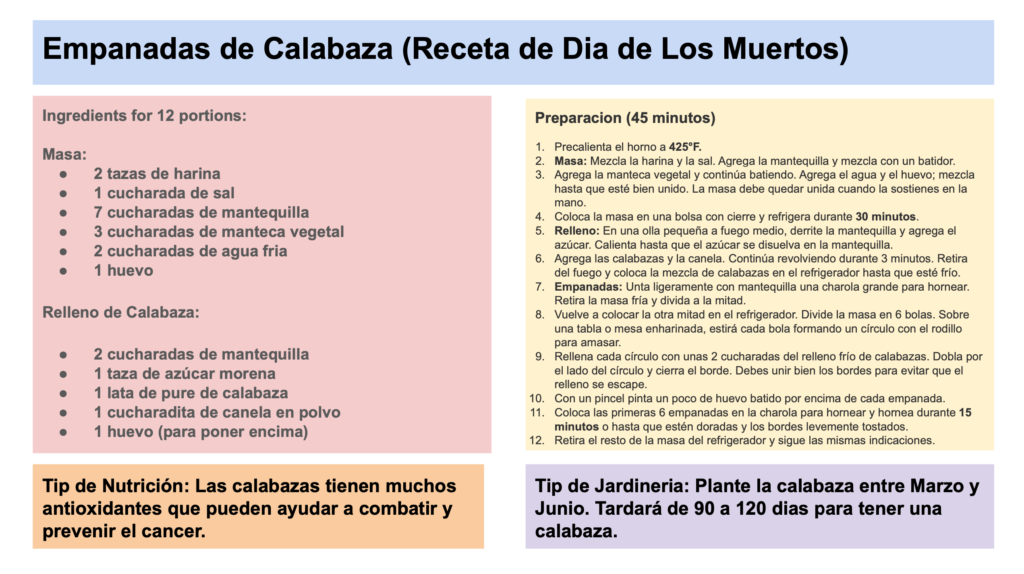

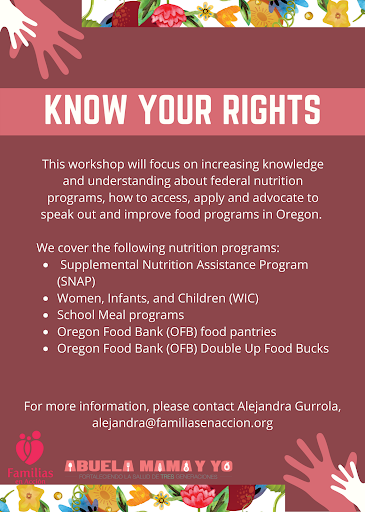
We would like to invite you to join one of our webinars, to learn together how to access food during this pandemic. Check our Training & Community Classes page for more information.
These webinars will be updated quarterly.
“The true measure of any society can be found in how it treats its most vulnerable members.” These words spoken by Mahatma Gandhi can guide us IF we take pause and reexamine the values and norms that have become the American way of life. The norm that profits, not health, drive our health care system. The norm that accepts health disparities for Latinos, African Americans, elderly and other vulnerable groups.
Health and economic security for all Oregonians is an achievable goal! But we Oregonians must face some painful but important truths: that we have become complacent in our values, in who deserves to be healthy and who will thrive. Yes, even here in Oregon.
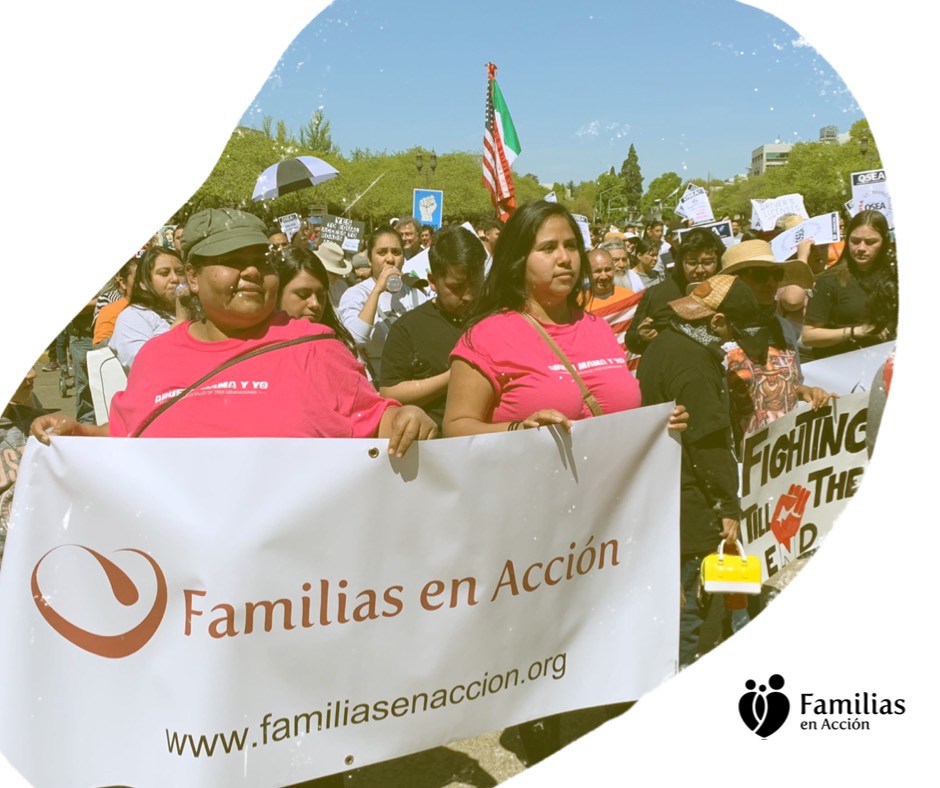
Here in Oregon and around the country, looking past death “rates” of COVID-19 to the actual people who are dying, we see the inequities. If we look past the food shortage at our grocery store, we see that work in the fields and processing plants is deemed “essential” yet the workers themselves are not seen as essential or even worthy. Yet these are the workers that allow Oregonians to “shelter in place.”
To keep Oregon’s economy moving these essential workers have increased risk exposure. According to Washington County, nearly 60% of their Latinx community members who tested positive for COVID-19 work in health care, outdoor labor, factory/warehouse work, food service or grocery stores. In Marion County, about 35 percent of COVID-19 cases are Hispanic when only 27% of the residents are of Hispanic origin. Across our state Latinos make up 13-16% of the population yet make up 27% of those tested positive. Those numbers are undoubtedly low due to the lack of access to medical care.

Poverty and health are linked. Unfortunately this is not a surprise to community leaders and health experts. The disparities have been there for a long time. The question is: why has so little been done here in Oregon to systemically address the significant health and economic issues that underlie the COVID statistics? Is it racism, elitism or other isms? Is it that some voices are not legitimate and do not count in the culture of Oregonian politics. Is it that jobs are defined as “essential” but the people who perform them are not?
We know the answers. Communities of color and public health experts of color have solutions for health equity and models for eliminating health disparities. We know that equitable partnerships between public health departments, health systems and community based organizations can reduce health disparities. We know that Community Health Workers/Promotoras de Salud can improve chronic disease health outcomes for vulnerable community members. We have the data and the models.
This horrific pandemic demonstrates the overdue need for a different way of problem solving. We have seen that no one institution has the answers, capacity, and resources to bring us out of this pandemic. Addressing the underlying health disparities during and post the COVID-19 requires partnerships between public, private, and community-based organizations. Community leaders and health experts have seen that such partnerships work when they listen to the voices of those most impacted.
The pain of this pandemic is our opportunity for changes in Oregon. Will we be more prepared for our next global health crisis? The now obvious disparities in our systems need to be addressed. And the values underneath those systems need clarity. What values will define us? Who will we elect to implement those values? It is up to all Oregonians to decide how we should proceed after this pandemic. It is up to all of us to define what the “new normal” will look like.
| Izzy Meda Marie Dahlstrom Executive Director Founder Familias en Acción Familias en Acción Portland, Oregon Rosemary Celaya-Alston Rebecca Huntley Founder Writer Familias en Acción Familias en Acción |
COVID-19, which stands for coronavirus disease 2019, was first identified in Wuhan, the capital of Hubei Province, China in December 2019 and has now spread into a global pandemic. Governments around the world are rushing to institute measures that will keep families safe and limit the spread of the virus.
For the Latino community that already faces inequities in healthcare and accessing food, COVID-19 increases those disadvantages. Civic leaders are urging the government to consider economic inequalities that put people at higher risk of suffering from COVID-197. Advocacy groups highlight the need for the government to respond to the decision that some families, such as those working in hospitality, childcare, and retail, must make between potentially missing a paycheck and ensuring the health of their families8. This past Wednesday evening, President Trump signed a coronavirus aid package into effect that will expand unemployment assistance and the government is currently working on a $1 trillion proposal that, if passed, could provide economic stimulus for workers9.
Of particular concern is how people are accessing food in this time of crisis. Our food safety nets have not been tested like this since the time of the Great Recession in 20084. With businesses temporarily closing, children out of school, and other changes implemented to keep people safe, what does this mean for how you get food and stay healthy?
With sudden job layoffs and reduced work hours, people may have less money to spend on food. The nation’s primary safety net to combat food insecurity is the Supplemental Nutrition Assistance Program (SNAP or food stamps)4. In the face of this, the government has decided to suspend changes to the SNAP program that were set to go into effect April 1st, 20201. The changes would have altered work requirements for single adults receiving SNAP benefits but will not take effect while the nation faces coronavirus.
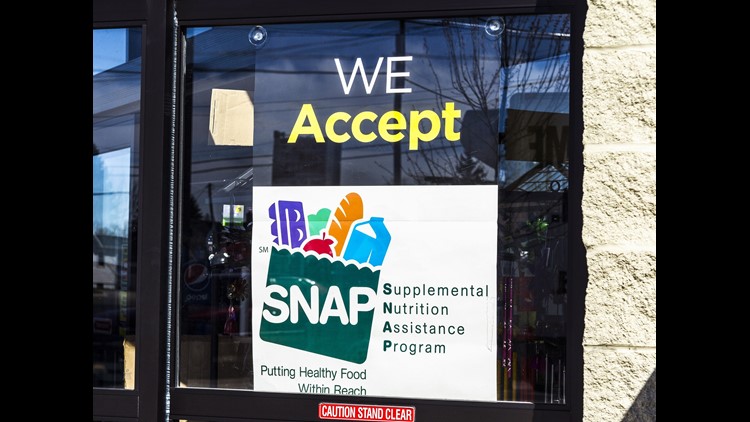
For some businesses, it is work as usual. As of March 19th, 2020, the US government deemed agriculture as a critical infrastructure, meaning that farms can keep operating like normal6. Some businesses may decide individually to modify operations, but in the face of this and other environmental threats such as climate change, the people that grow our food are finding innovative ways to continue providing the nation with food.
But how people access food is being limited. On March 17th, 2020 Oregon Governor Kate Brown signed an order which prohibits food establishments to offer on-site dining, along with prohibiting public gatherings of 25 people or more. Grocery stores and most farmers markets have been allowed to remain open. A vital resource, at participating farmers markets, SNAP recipients can double up to $10 per day spent on fruits and veggies with a program called Double Up Food Bucks (DUFB).
Additionally, mothers and children participating in the Women, Infants, and Children (WIC), may be affected by people who are buying food they don’t normally buy at the store. WIC dollars can be spent on certain foods, indicated by a WIC symbol next to the price tag. If you are buying food and it has a WIC symbol next to it and you don’t need it, consider choosing something different so that it can be available for a WIC participant2.
Taking care of infant nutrition in this time of crisis is also important. If you are or know somebody who is breastfeeding and worried about passing COVID-19 to the baby, the United States Centers for Disease Control and Prevention (CDC) currently recommends washing hands before breastfeeding and wearing a mask during breastfeeding to avoid passing the virus between mother and child. But, because so little is known about the virus, it’s unclear if it can be passed from the mother to the infant in breast milk3. Because breast milk is the most nutritious source of food for babies, it’s recommended to continue breastfeeding3.
Keeping safe and healthy may seem difficult in these times, but as more advocacy groups push for the government to recognize the disproportionate burden that social inequities place on racial minorities, including Latinos and Hispanics, resources are being expanded.
For more information on breastfeeding, go here: https://www.cdc.gov/coronavirus/2019-ncov/prepare/pregnancy-breastfeeding.html
If you have had changes to your income, apply for food stamps here: https://apps.state.or.us/onlineApplication/#NewClientAccount.
To see which farmers markets in Oregon are participating in DUFB and open, go here: https://doubleuporegon.org/
El COVID-19, que significa enfermedad por coronavirus 2019, fue identificado por primera vez en Wuhan, la capital de la provincia Hubei, China en diciembre del 2019. Ahora se ha propagado al punto de convertirse en una pandemia global. Gobiernos alrededor del mundo se apresuran para instituir medidas que mantengan seguras a las familias y que limiten el avance del virus.
Para la comunidad latina, que de por sí enfrenta desigualdades con respecto al cuidado de la salud y al acceso a la comida, la presencia del COVID-91 aumenta las desventajas ya existentes. Los líderes civiles instan a nuestro gobierno a considerar las desigualdades económicas que ponen a ciertos sectores en mayor riesgo de contraer este virus. Las agencias que se encargan de defender a estas personas recalcan lo vital que es la respuesta gubernamental a la cuestión de si algunos empleados, como los que trabajan en servicios, guarderías o tiendas, deben trabajar aún arriesgando el bienestar de sus familias porque requieren su quincena. El miércoles pasado, el Presidente Trump aprobó un paquete de ayuda relacionado con el coronavirus que expandirá las prestaciones de desempleo, y el gobierno está armando una propuesta adicional que liberaría un trillón de dólares para apoyar la economía de los trabajadores. Pero ¿qué ocurrirá con los que no pueden solicitar la ayuda, debido a su estado migratorio?
Es particularmente preocupante la cuestión de cómo las familias seguirán alimentándose durante esta contingencia. Nuestro abasto alimentario no ha enfrentado semejante crisis desde la Gran Recesión de 2008. Puesto que abundan los cierres de negocios pequeños y los niños no van a la escuela, junto con otras medidas para salvaguardar la salud comunitaria ¿por qué medio conseguirán las familias su alimento y cómo se mantendrán saludables?
Con repentinos despidos y reducciones en el número de horas laborales, la gente tiene menos dinero para gastar en comida. El mayor sistema que tiene la nación para combatir la inseguridad alimentaria es el Supplemental Nutrition Assistance Program (SNAP, también conocido como estampillas para alimentos). Por este motivo, el gobierno ha decidido suspender las modificaciones al programa SNAP fijas para el 1 de abril del 2020. Son cambios que hubieran subido los requisitos de trabajo para los adultos solteros que recibieron las prestaciones SNAP, pero no tomarán efecto mientras la nación batalle el coronavirus.
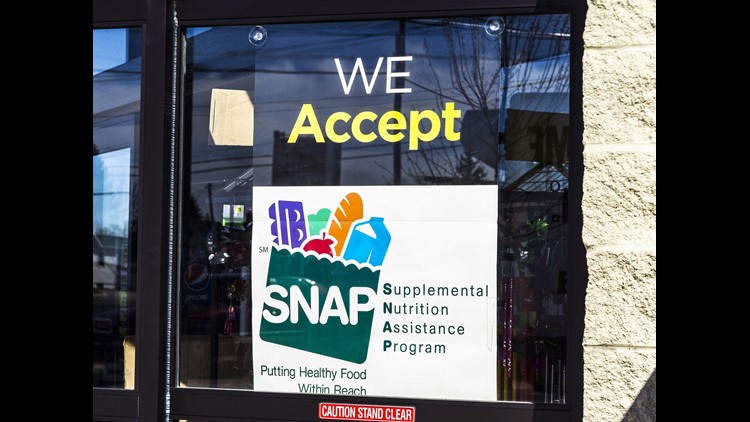
Algunos negocios siguen trabajando igual que antes. El 19 de marzo de 2020, el gobierno de los Estados Unidos decretó que la agricultura representa una infraestructura crítica, para que las granjas pudieran seguir operando de manera normal. Algunos negocios quizá modifiquen sus operaciones de forma autónoma; al enfrentar esta crisis y la del cambio climático, la gente que cultiva nuestra comida ha encontrado modos innovadores de continuar abasteciendo a la nación.
Por otro lado, se está reduciendo el acceso a la comida. El 17 de marzo de 2020, la Gobernadora de Oregon Kate Brown firmó una orden prohibiendo que los restaurantes ofrecieran servicio de mesa, y además prohibió las reuniones públicas de más de 25 personas. Sin embargo, las tiendas de abarrotes y la mayor parte de los mercados al aïre libre han podido seguir abiertas. Además, en algunos tianguis participantes, debido a un programa llamado Dólares Dobles para Comprar Comida (DUFB), la gente que cuenta con estampillas SNAP pueden llevarse el doble de mercancía por el mismo costo (hasta un valor de $10 por día) al comprar frutas y verduras.
Las mamás e hijos que participen en Women, Infants and Children (WIC) quizá sean afectados, si las personas que no cuenten con WIC llegan a comprar los productos que llevan el símbolo. Los “Dólares WIC” sólo se pueden usar para comprar ciertos productos; si usted no tiene WIC, sería mejor escoger algún otro producto que no lleve el símbolo, para que una participante lo pueda adquirir.
Es vital cuidar la nutrición infantil durante este momento de crisis. Si usted o alguien que usted conoce está amamantando y existe la preocupación de pasar el COVID-19 al bebé, debe saber que el Centro Nacional de Prevención y Control de las Enfermedades (CDC) recomienda actualmente que las manos se laven antes de amamantar y que la mamá se ponga cubrebocas durante el amamanto, para evitar la posibilidad de un contagio entre ella y su bebé. Por otro lado, se conoce tan poco sobre el nuevo virus que aún no se sabe con certeza si se puede transmitir por medio de la leche materna.
Mantenernos sanos y saludables quizá parezca difícil en estos tiempos, pero sí se pueden ampliar los recursos disponibles para las minorías raciales, incluyendo a los latinos, siempre y cuando los grupos de defensa sigamos instando al gobierno a reconocer que las desigualdades sociales causan mucho mayor sufrimiento en estos sectores.
Para mayor información sobre el amamanto, vea: https://espanol.cdc.gov/enes/coronavirus/2019-ncov/prepare/pregnancy-breastfeeding.html
Si su sueldo ha disminuido, puede solicitar estampillas para alimentos aquí:
Para conocer los tianguis (mercados al aïre libre) en Oregon que participan en DUFB y que siguen abiertos, vea: https://doubleuporegon.org/
References | Referencias
1. https://www.buzzfeednews.com/article/paulmcleod/coronavirus-trump-food-stamp-change
3. https://www.cdc.gov/coronavirus/2019-ncov/prepare/pregnancy-breastfeeding.html
5. https://content.govdelivery.com/accounts/ORODA/bulletins/281f94a
7. https://www.hrw.org/news/2020/03/19/us-address-impact-covid-19-poor
8. https://www.hrw.org/news/2020/03/19/us-address-impact-covid-19-poor9. https://www.npr.org/2020/03/18/817737690/senate-passes-coronavirus-emergency-aid-sending-plan-to-president

We want to share a little of Adriana Govea’s story with you. She’s from Mexico City and moved to the United States in 1994. She began participating at Familias en Acción in 2018, where most of her effort has been devoted to our Abuela, Mamaá, y Yo (AMY) program. Adriana has also taken part in Familias’ leadership training programs, including AMY training, and she has become an active advocate for improving the health of her family and community. When asked about AMY, she said, “I love it. I grew up with my Grandma, and this program reminds me of her and her traditional dishes. For me, she is still alive and present; she made me what I am today. AMY takes you back and makes you think about your roots and where you came from. It’s easy to move somewhere and adapt to the culture, forgetting who you are. So AMY makes you reflect on who you are and think, ‘Why am I here, what am I doing? I came for a dream, to keep my family moving forward…”
She believes AMY “promotes leadership and provides a model that doesn’t try to change people…It helps you recognize that you have a voice and makes you see a reflection of yourself.”
Adriana sees her community as strong and connected. “We treat everyone equally, we are united, and we strive even while living in a place with so much hate and with people reminding us that we’re not from here…yet we can still remain positive.” However, Adriana wants to see more “equity and more opportunities for everyone, especially more programs like AMY. AMY is a welcoming program where “You want to be here because of who you are, not who you represent.”
Here is one of Adriana’s favorite recipes that she would like to share with our communities:
Recipe: Vaquera salad
Ingredients:
Instructions:
Cook each type of beans until well-cooked. Chop the peppers, onion and tomatoes in cubes. Put the vegetables in a large bowl and add all the cooked beans. Peel and chop the garlic. In a small bowl, combine it with the oil, salt, pepper and lime juice to make the dressing. Add the dressing to a large bowl and mix well. Garnish with cilantro or avocados. Enjoy!
As our Abuela, Mamá, y Yo (AMY) program has grown and expanded in the last few months, we would like to introduce a new series of featured recipes that will be shared by various people throughout the Latino + Latinx communities of Oregon who are involved in the AMY program.
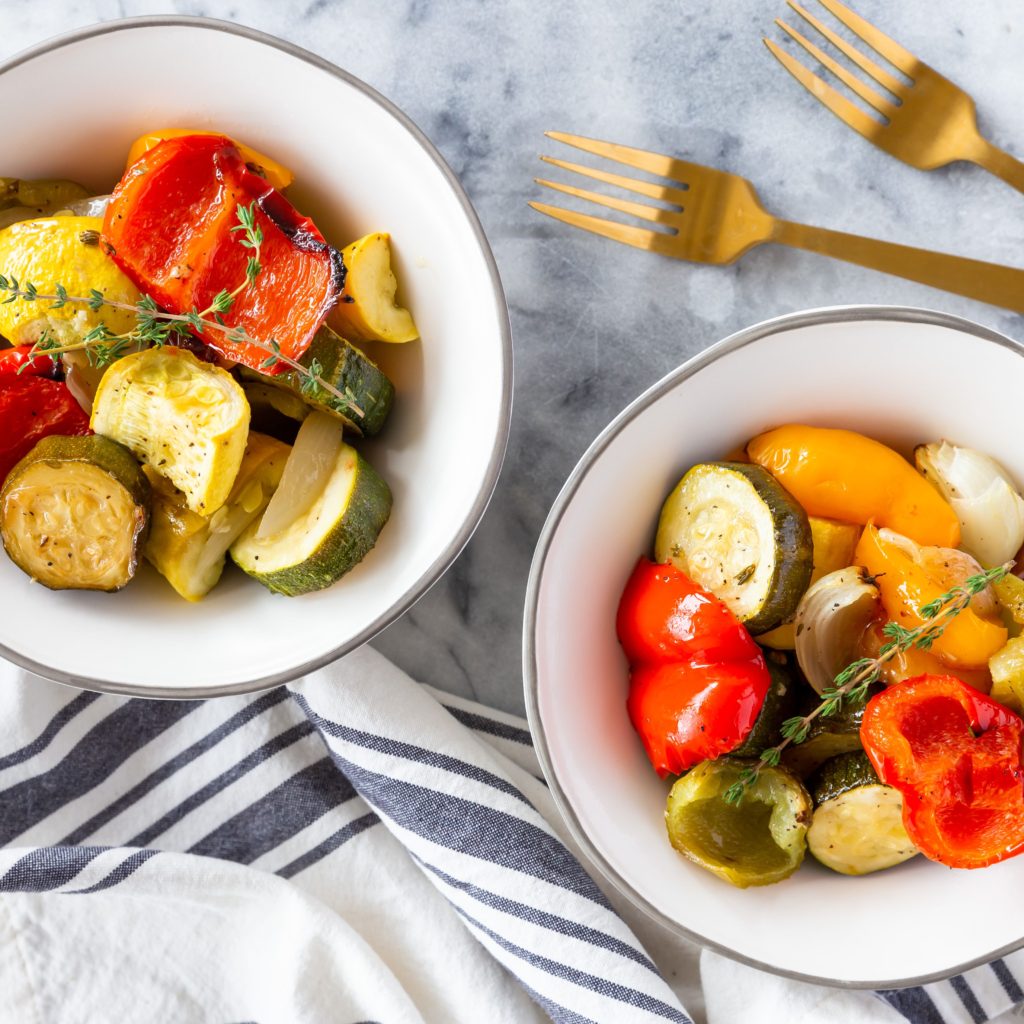
Interview by Rebeca Márquez
María recognizes that times are hard. “Our mental state is not easy, what with racism, discrimination, and the need to be forever alert, wondering how we look to others, how our ethnicity goes over.” Her dream is for the Latino community to feel proud of who we are and also knowledgeable of how to take care of ourselves. She would like us to make exercise a part of our everyday lives and to modify traditional recipes to make them healthier. She has been delighted to form part of “Abuela, Mamá y Yo” and likes to imagine a future in which we are healthy and strong. She understands that to get there, we must take action now.
I would like to tell you a little about María Segura. She is from Mexico and arrived in the U.S. eleven years ago. For the past five years, she has been actively involved in the programs that Familias en Acción offers. After taking leadership seminars and thorough training, she now facilitates several of our health education programs: Abuela, Mamá y Yo, “Tomando Control de su Salud”, “Manejo Personal de su Diabetes”, “Camine con Gusto”, “Siembra la Cena” and ”Empoderate”. What she likes best about our “Abuela, Mamá y Yo” nutrition and Food Equity program is that it’s focus on healthy eating, something not always easy to achieve. “It teaches you about serving moderate portions, modifying traditional recipes, and something even more important: breaking bread with family, friends, and your community.” She considers an openness to learning new things as an attribute of the Latino community. However, she adds that “…we need more educational programs that help us promote our health, prevent diseases, and set a good example for our kids.” She also mentions how important traditions are and how proud she is that they are passed down from one generation to the next. She is a model for her children and her community, as well as an inspiration due to her work with us. María would like to share one of her favorite recipes with you. Enjoy!
Multicolor Squash
Ingredients:
Procedure:
Chop up onion and garlic. Cut vegetables in julienne strips. Stir fry onion and garlic, add squash and peppers, cook on low heat for seven minutes. Season to taste. Enjoy!
The ability to drive legally is vital for many families in Oregon. They need to take their kids to school, commute to work, and contribute to their communities. Without the ability to apply for a license to drive, parents and families are forced to make impossible choices.Having the ability to apply for a license to drive gives all Oregonians, including those without legal status, the opportunity to follow the law, get to work and school safely, and provide for their families and communities.
More information at
https://causaoregon.org/driverslicenses/
Excluding Oregonians from the ability to get a driver’s license because of their citizenship or immigration status puts our neighbors at risk and makes it harder for them to care for themselves and build a better life for their families. Help us pass HB 2015 by contacting your legislator today!
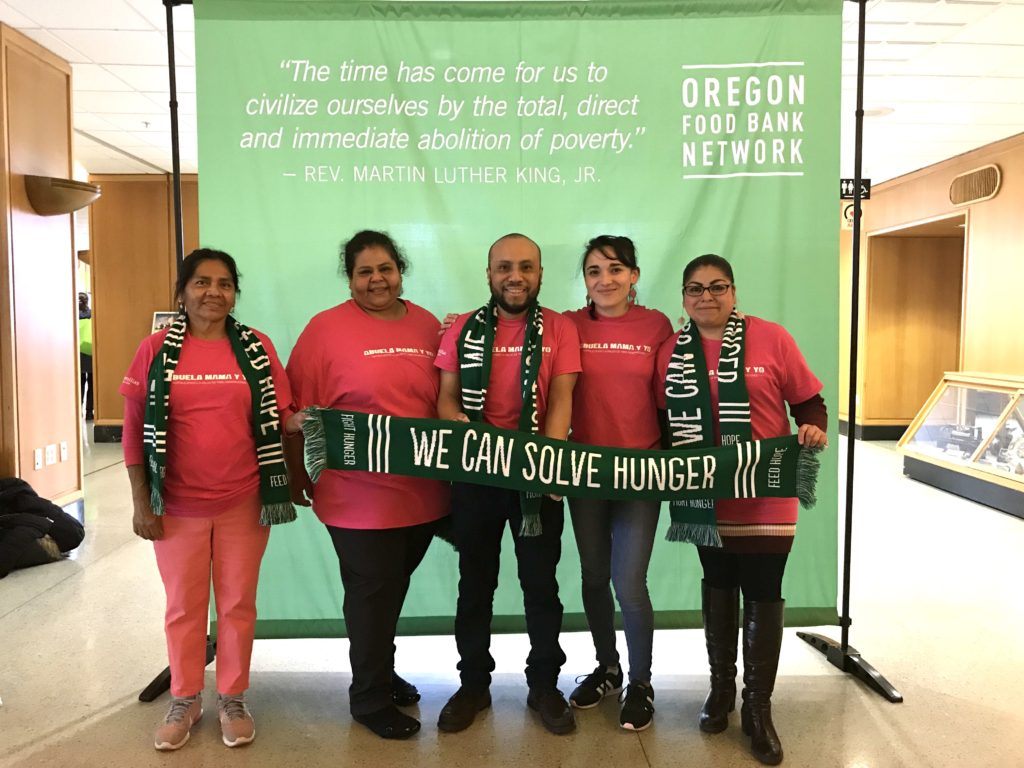
Familias en Acción, through our Abuela, Mamá y Yo Community Council visited the Capitol last Thursday April 11. We participated in the Oregon Hunger Response Day, because we consider this a priority for the Latino Community and we need to learn more, to be informed and be capable of sharing this in our communities. We all know that Latino families struggle to access healthy nutritious food, sometimes because of lack of transportation and or food deserts, sometimes because of fear that we might be targeted if we apply for food assistance services, etc.
The goal of our Community Council is to learn more about health and food policy and become advocates for our families’ health.
Familias en Acción supporting the work of The Oregon Food Bank to end hunger by: ensuring access to affordable housing, securing funding for food banks, increasing SNAP match dollars at farmers markets and rural grocery stores across the state, raising the age for WIC to 6 and many others.
During a full day training our AMY Community Council attended workshops on Advocacy, learned about Double-up bucks, access to SNAP, Oregon Hunger Response Fund and more. After a full morning of trainings, we all walked to the Capitol and we were able express our voice, needs and share why it’s important to end hunger in the Latino community to legislators.

AMY’s Community Council goal is to develop strategies and build advocacy skills to impact equitable health policies in Oregon. Members are volunteers who share knowledge on parenting, pregnancy, early childhood development, prenatal care, food equity, health disparities and latino community social services.
So far, the Community council has identified policy issues that include the following:1. equitable access to healthy food; 2. increased access to prenatal education and early childhood education; and 3. reduced access to sugar sweetened beverages.
During its first year (2018), the Community Council has conducted training sessions on the importance of nutrition during pregnancy and epigenetics; it has also revised the Abuela, Mamá y Yo Curriculum and participated in focus groups in Portland, Hermiston, and Woodburn. Furthermore, the Community Council participated in campaign against Measure 105, which was defeated.
The Council has held discussions about social determinants of health and barriers to food access such as lack of transportation, community gardens, and understandable, accurate information about different programs such as Supplemental Nutrition Assistance (SNAP), the Special Supplemental Nutrition Program for Women and Infants and Children (WIC), and Double-up Bucks. A theme they have all shared is the mistrust and fear people experience due to the uncertainty of whether it is safe to apply for these benefits due to the possible impact on legal status, especially considering recent public charge policies.
For 2019, the Community Council has decided to learn more about food assistance services such SNAP, WIC, and Double-Up Bucks and how they might be affected by public charge. In March 2019, the Community Council got trained on SNAP and did secret shopper visits to DHS offices with the purpose of evaluating customer service and learn more about the process. Stay posted for more Community Council updates!